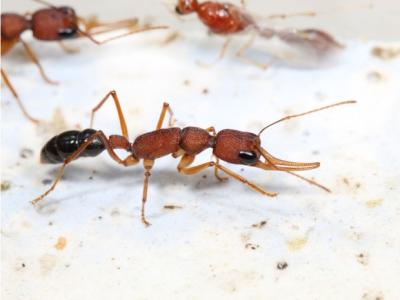An insulin-suppressing protein may be the fountain of youth for ants and provides clues about aging in other species, according to a study led by New York University researchers, including NEI grantee Claude Desplan.
Published in Science, the study shows that queen ants exhibit high metabolism for reproduction without undergoing aging by generating an anti-insulin protein that blocks only part of the insulin pathway that is responsible for aging.

Harpegnathos saltator ants. Image credit: Hua Yan, New York University
When the Harpegnathos queen dies in a colony, a peculiar event occurs: female worker ants duel each other with their antennae, vying to become the next queen. The duel winners change “caste” in the ant society and become pseudoqueens, also known as gamergates, while still remaining in the (smaller) body of a worker. Pseudoqueens acquire queen-like behaviors, including laying eggs, and their life expectancy substantially increases from seven months to four years. But, if they are replaced by another queen, they revert to their worker status, stop laying eggs, and their lifespan is shortened back to seven months.
“By undergoing reversible ‘caste switching’ from workers to pseudoqueens that results in a dramatic increase in both their lifespan and ability to reproduce, Harpegnathos ants provide a unique opportunity to study how aging and reproduction can be disconnected,” said Desplan.